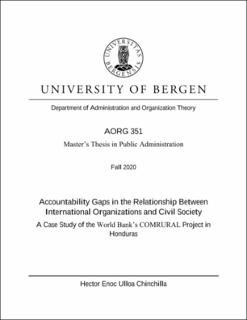Accountability Gaps in the Relationship Between International Organizations and Civil Society: A Case Study of the World Bank’s COMRURAL Project in Honduras
Master thesis
Permanent lenke
https://hdl.handle.net/11250/2725245Utgivelsesdato
2020-12-01Metadata
Vis full innførselSamlinger
- Master theses [88]
Sammendrag
Projects implemented by international organizations have direct impacts on people’s daily lives in the countries where they are executed. Due to this, increasing attention has been given to the accountability mechanisms that international organizations use and the effectiveness of these mechanisms. The following research seeks to expand the knowledge about accountability relationships between international organizations and civil society in recipient countries where projects are implemented. This is done by describing the accountability relationship between an international organization and the members of civil society impacted by one of their projects; more specifically, this paper provides a descriptive case study of the Honduras Rural Competitiveness project (COMRURAL) funded by the World Bank in Honduras. This study relies on accountability theory to provide an empirical description about the accountability relationship between agents and principals/would-be principals in the COMRURAL project. In order to provide a valid description, the accountability relationship concept is systematized and afterwards operationalized into four dimensions: Transparency, Participation, Evaluation, and Complaint and Response Mechanisms. Data about these four dimensions has been collected through document analysis, interviews and direct observations. An in-depth image about each one of these dimensions is given by addressing how, within each of them, policies were created, their content, how they were implemented, and their degree of accessibility for members of civil society. After providing an empirical description of the accountability relationship, accountability gaps are identified, and the missing elements from the theoretically perfect accountability relationship are pin pointed. A thorough discussion is presented regarding the identified accountability gaps, some of which are trans-dimensional gaps and other dimension-specific ones. Among them, we can mention the lack of appeal processes, the limited consultation process during policy development, the fusion of mechanisms that deal with transparency, the varying degrees of decision-making influence across civil society members, the lack of accountability mechanisms for indigenous participants, and the limited role civil society has in evaluations. Possible explanations are given for the described situations, but no causal relationship has been tested. This research has made it possible to demonstrate how a specific accountability gap can impact different members of civil society in varying degrees or in different ways. Additionally, possible theoretical explanations are presented for certain organizational attitudes identified in the agents and principals/would-be principals of the COMRURAL project. These could be studied more deeply in order to establish whether or not they have an impact on accountability relationships. Ultimately, this work contributes empirical data that can be used to further study the causal factors of why accountability gaps occur, their impacts on civil society, and whether or not these are generalizable to other projects carried out by international organizations.
